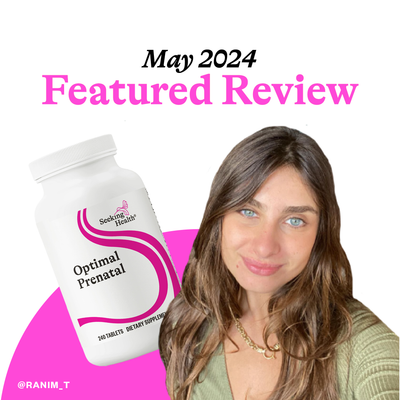It is estimated that over 50 percent of us — yes, possibly you — have at least one variation in the gene required to get adequate vitamin B9 (folate). (1, 2)
A deficiency in folate can contribute to, and play major roles in issues such as infertility, heart conditions, certain cancers, depression, and psychiatric disorders. (3, 4, 5)
Because of this, many of us are at a greater risk for these conditions. No wonder they are so common!
Folate deficiency causes a malfunctioning of one of the most important biochemical processes in our bodies, called methylation. This process depends on two essential B vitamins to be working: B12 and folate. (6, 7, 8)
Before we dive in, I’d like to introduce you to Methyl B12 with L-Methylfolate, one of our best selling supplements at Seeking Health. This lozenge contains potent doses of folate and B12 in a delicious lozenge, designed to support the incredible process we call methylation.†
Why does Methylation Matter?
Methylation controls nearly every biochemical process in your body, including whether your genes are expressed properly. (9, 10, 11)
Methylation is defined as the transfer of a “methyl” group from one compound to another. A methyl group consists of one carbon and three hydrogen atoms. Methylation was formerly known as “one carbon metabolism.” By adding an extra carbon to a compound, it completely changes its shape. In the human body, form equals function. This critical process literally transforms a multitude of important compounds including hormones, neurotransmitters, liver tissue, and most notably...DNA.
Methylation is extremely sensitive, adaptive, and responsive to the environment. It can literally turn the switch “on” or “off” for certain genes based on the status of our environment. (9, 10, 11) For methylation to be working adequately, you need the assistance of vitamin B12 and folate to carry out this carbon transfer. (12)
Why B12 and Folate are Needed for Methylation
When you eat folate from food, it is processed via the folate pathway. (13, 14)
The last step of the folate pathway is the MTHFR enzyme. This enzyme converts folate into the usable, methylated form, known as 5-methyltetrahydrofolate (5-MTHF). It is this form of folate that has a methyl-group ready to transfer to vitamin B12.
This newly methylated folate meets B12 at the MTR enzyme where it passes off its methyl group. Vitamin B12 accepts the methyl group and passes it on to homocysteine to form methionine. It is methionine that finally gets the honor of distributing this important methyl group to hundreds of different compounds in the human body. But none of this happens without folate donating the methyl group, and B12 playing a quick game of “hot potato” with it.
If the MTHFR enzyme (or any other enzyme) is slowed down from genetic variations or external stress, it can cause a debilitating deficiency of both folate and B12 in the body. And to make matters worse, doctors will sometimes prescribe the man-made version of folate, called folic acid, during pregnancy or for fertility issues or depression, which can ironically slow down multiple enzymes responsible for the production of vitamin B12 and folate. This can further deplete your folate and B12 levels causing pain, mental and emotional issues, detoxification issues, and much more! (13, 14, 15, 16, 17, 18, 19)

The good news?
By supplementing with the true form of folate — 5-MTHF — and true forms of B12 — methylcobalamin and adenosylcobalamin — you bypass your MTHFR enzyme and other enzymatic processes that may be slowed down.† (20)
This means folate and B12 can flow into the methylation pathway via your MTR enzyme, and help to transform homocysteine into methionine. You want the transformation of homocysteine to methionine happening efficiently in your body. High levels of homocysteine have been correlated with heart disease, dementia, and other health concerns. (14)
From the compound methionine, a methylated form, called S-adenosylmethionine (SAMe) is created. SAMe is your body’s main methyl donor. SAMe ultimately donates all of its methyl groups to your body's methylation processes. A large portion (approximately 70%) of methylation goes toward making phosphatidylcholine and creatine. (21) Phosphatidylcholine makes up your cell walls, and creatine plays important roles in ATP production (energy), especially for muscles and the brain (movement and thinking).†
Methylation is important for neurotransmitter production, homocysteine breakdown (heart and cognitive health), hormone balance, detoxification, immune system function, energy production, and so much more. (9, 10, 11, 22, 23, 24, 25)
As you can see, if you’re lacking adequate methyl groups, many of your body’s biochemical processes will not be working smoothly!
Will Any B12 and Folate Supplement Work?
Here’s something else to know — you cannot just go to your local grocery store and pick the first B12 and folate supplement you see.
Why?
Many brands contain that man-made folic acid we just spoke about (that may worsen folate deficiency).*
They also commonly contain a man-made form of vitamin B12, called cyanocobalamin. Cyanocobalamin is attached to a cyanide molecule and is not well absorbed. For this reason, supplementing with cyanocobalamin may not help a B12 deficiency, and may even make it worse. (26)
Now, let’s talk about absorption.
Are You Absorbing B12 and Folate?
You, like many others, may have a difficult time absorbing B12 or folate in a capsule form. In a person with normal digestive function, vitamin B12 and folate are absorbed in capsule form with little difficulty. However, many people struggle with their ability to properly digest and absorb nutrients, whether or not they know it! To enhance the absorption opportunity, a lozenge format is the optimal choice, especially if you are deficient in these two B vitamins.The bioavailable forms of B12 and folate, and the lozenge format of Methyl B12 with L-Methylfolate allow for optimal absorption and utilization of these two crucial B vitamins.*
Your Solution: Methyl B12 with L-Methylfolate
Methyl B12 with L-Methylfolate contains a blend of the active forms of vitamin b12:
- Methylcobalamin
- Adenosylcobalamin
Along with the active form of folate, using a superior, trademarked material by Quatrefolic®:
- 5-Methyltetrahydrofolate
This lozenge format allows for optimal absorption. Simply let it melt in your mouth before swallowing. (26)
There are no artificial colors, artificial flavors, artificial preservatives, or cane sugar. Instead, the lozenge is made with xylitol, and has a great tasting natural cherry flavor that you are going to love!
People also love that this product is designed to support healthy energy, mental clarity, and positive wellbeing.*

Methyl B12 with L-Methylfolate was designed by Dr. Ben Lynch, who has spent years researching why people struggle with so many modern-day health issues. Through his research, he discovered a common thread in a majority of these issues — methylation. To overcome the methylation roadblock that so many people struggle with, Dr. Lynch formulates all of Seeking Health’s supplements utilizing the concept of nutrigenomics: the science of how targeted nutrition and specific nutrients can optimize the expression of our genes, which in turn, can influence the expression of health conditions and diseases.†
When you optimize your methylation processes with true forms of methylated nutrients, the result is that you feel energized and clear-headed, and your bodily systems can start healthfully functioning at full capacity again.†
Say hello to supporting healthy mood, energy, detoxification, homocysteine regulation, hormone balance, and so much more.†
Get Methyl B12 with L-Methylfolate here.
The Bottom Line
Methylation is not just a complicated word for scientists. It’s a process that is happening in your body every second influencing your overall health. Unfortunately, some people have genetic mutations or nutritional deficiencies that slow down their methylation cycles.
By nourishing your body’s ability to methylate using Methyl B12 with L-Methylfolate, you can experience support for multiple areas of your health. This lozenge contains potent doses of B12 and folate, in bioavailable forms, to allow for optimal absorption compared to a traditional capsule format.†
But don’t take my word for it!
Click ‘add to cart’ now and see for yourself.
Sensitive to Methylated Nutrients?
Some people are sensitive to methylated nutrients — they may get anxiety or other side effects after taking B vitamins. If you’re in this boat, check out our Hydroxo B12 with Folinic Acid, a similar formula that uses non-methylated B12 and folate.
References
(1) Heterogeneity in the prevalence of methylenetetrahydrofolate reductase gene polymorphisms in women of different ethnic groups https://pubmed.ncbi.nlm.nih.gov/12589326/
(2) The prevalence of folate-remedial MTHFR enzyme variants in humans https://www.ncbi.nlm.nih.gov/pmc/articles/PMC2430358/
(3) Folate and vitamin B12 status in schizophrenic patients https://www.ncbi.nlm.nih.gov/pmc/articles/PMC3252772/
(4) The 677CT (rs1801133) polymorphism in the MTHFR gene contributes to colorectal cancer risk: a meta-analysis based on 71 research studies https://pubmed.ncbi.nlm.nih.gov/23437053/
(5) [Relationship of MTHFR gene polymorphisms with infertility] https://pubmed.ncbi.nlm.nih.gov/26939404/
(6) Relationship of folate, vitamin B12 and methylation of insulin-like growth factor-II in maternal and cord blood https://pubmed.ncbi.nlm.nih.gov/21245875/
(7) Folate and vitamin B12 https://pubmed.ncbi.nlm.nih.gov/10466189/
(8) B12 and folate interrelationships https://pubmed.ncbi.nlm.nih.gov/3927946/
(9) DNA methylation in human diseases https://www.ncbi.nlm.nih.gov/pmc/articles/PMC6147084/
(10) Methylation matters https://www.ncbi.nlm.nih.gov/pmc/articles/PMC1734882/
(11) DNA methylation https://www.ncbi.nlm.nih.gov/pmc/articles/PMC3174260/
(12) Folate and B12 and methyl groups https://www.ncbi.nlm.nih.gov/pmc/articles/PMC3037834/
(13) Toward a better understanding of folate metabolism in health and disease https://www.ncbi.nlm.nih.gov/pmc/articles/PMC6363433/
(14) Overview of homocysteine and folate metabolism. With special references to cardiovascular disease and neural tube defects https://www.ncbi.nlm.nih.gov/pmc/articles/PMC3026708/
(15) Folate Nutrition and Blood-Brain Barrier Dysfunction https://www.ncbi.nlm.nih.gov/pmc/articles/PMC5385290/
(16) Folic Acid Supplementation and Pregnancy: More Than Just Neural Tube Defect Prevention https://www.ncbi.nlm.nih.gov/pmc/articles/PMC3218540/
(17) Unmetabolized Folic Acid Is Detected in Nearly All Serum Samples from US Children, Adolescents, and Adults1,2,3,4 https://www.ncbi.nlm.nih.gov/pmc/articles/PMC4336532/
(18) A 19-base pair deletion polymorphism in dihydrofolate reductase is associated with increased unmetabolized folic acid in plasma and decreased red blood cell folate https://pubmed.ncbi.nlm.nih.gov/19022952/
(19) The extremely slow and variable activity of dihydrofolate reductase in human liver and its implications for high folic acid intake https://pubmed.ncbi.nlm.nih.gov/19706381/
(20) Folate Insufficiency Due to MTHFR Deficiency Is Bypassed by 5-Methyltetrahydrofolate https://www.ncbi.nlm.nih.gov/pmc/articles/PMC7564482/
(21) Is it time to reevaluate methyl balance in humans? https://pubmed.ncbi.nlm.nih.gov/16400042/
(22) DNA Methylation and Its Basic Function https://www.ncbi.nlm.nih.gov/pmc/articles/PMC3521964/
(23) The Role of DNA Methylation in Cardiovascular Risk and Disease: Methodological Aspects, Study Design, and Data Analysis for Epidemiological Studies https://www.ncbi.nlm.nih.gov/pmc/articles/PMC4743554/
(24) Hormonal gene regulation through DNA methylation and demethylation https://pubmed.ncbi.nlm.nih.gov/22122081/
(25) Understanding the Relevance of DNA Methylation Changes in Immune Differentiation and Disease https://www.ncbi.nlm.nih.gov/pmc/articles/PMC7017047/
(26) Comparative Bioavailability and Utilization of Particular Forms of B12 Supplements With Potential to Mitigate B12-related Genetic Polymorphisms https://www.ncbi.nlm.nih.gov/pmc/articles/PMC5312744/











